Consultancy Report on Sustainable Business Practices for British Petroleum
VerifiedAdded on 2023/06/15
|9
|2568
|256
AI Summary
This report discusses sustainable business practices for British Petroleum, including background on sustainable operations, identified concerns, and alternative business practices. Recommendations include participating in industry-wide collaborations and implementing sustainable policies.
Contribute Materials
Your contribution can guide someone’s learning journey. Share your
documents today.
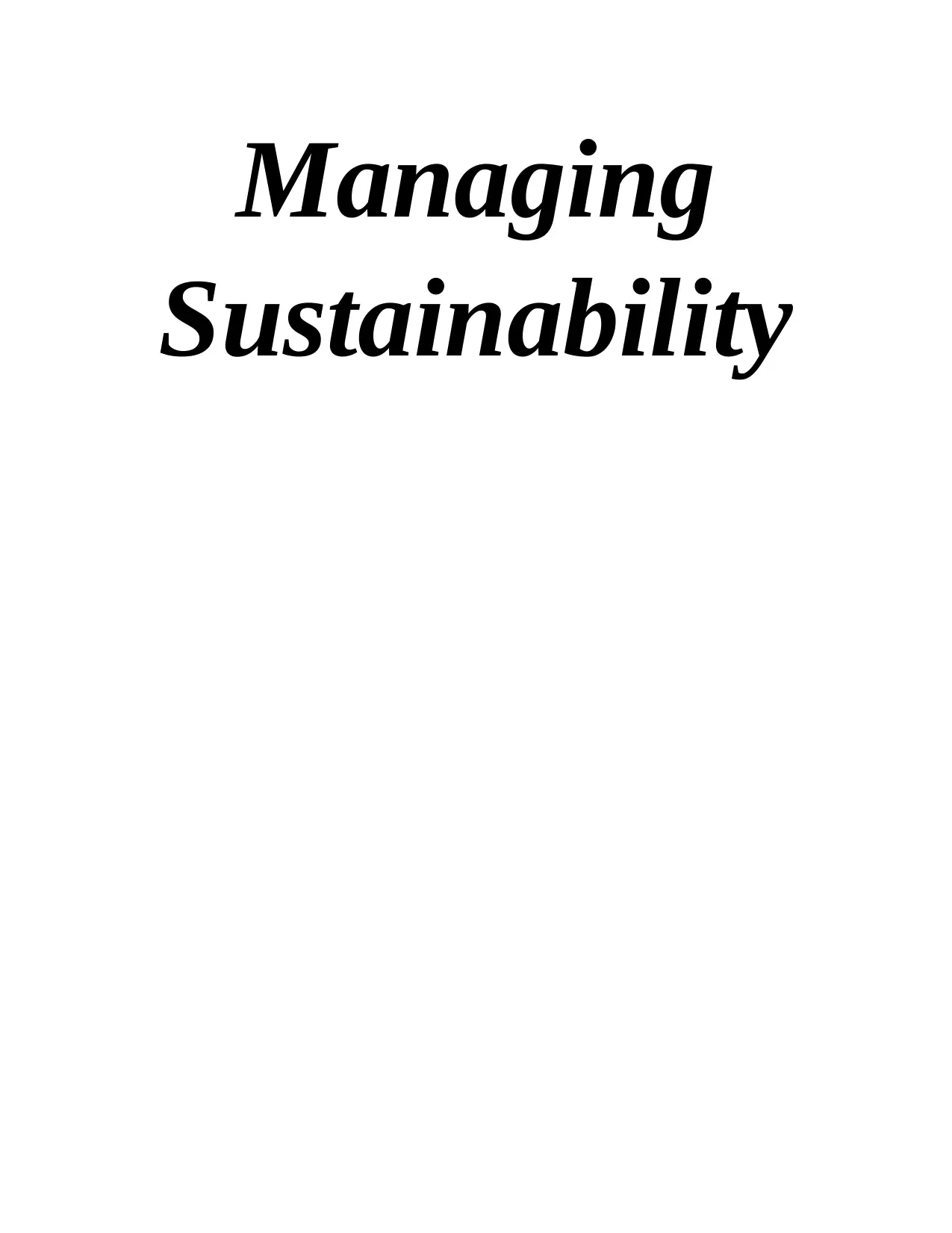
Managing
Sustainability
Sustainability
Secure Best Marks with AI Grader
Need help grading? Try our AI Grader for instant feedback on your assignments.
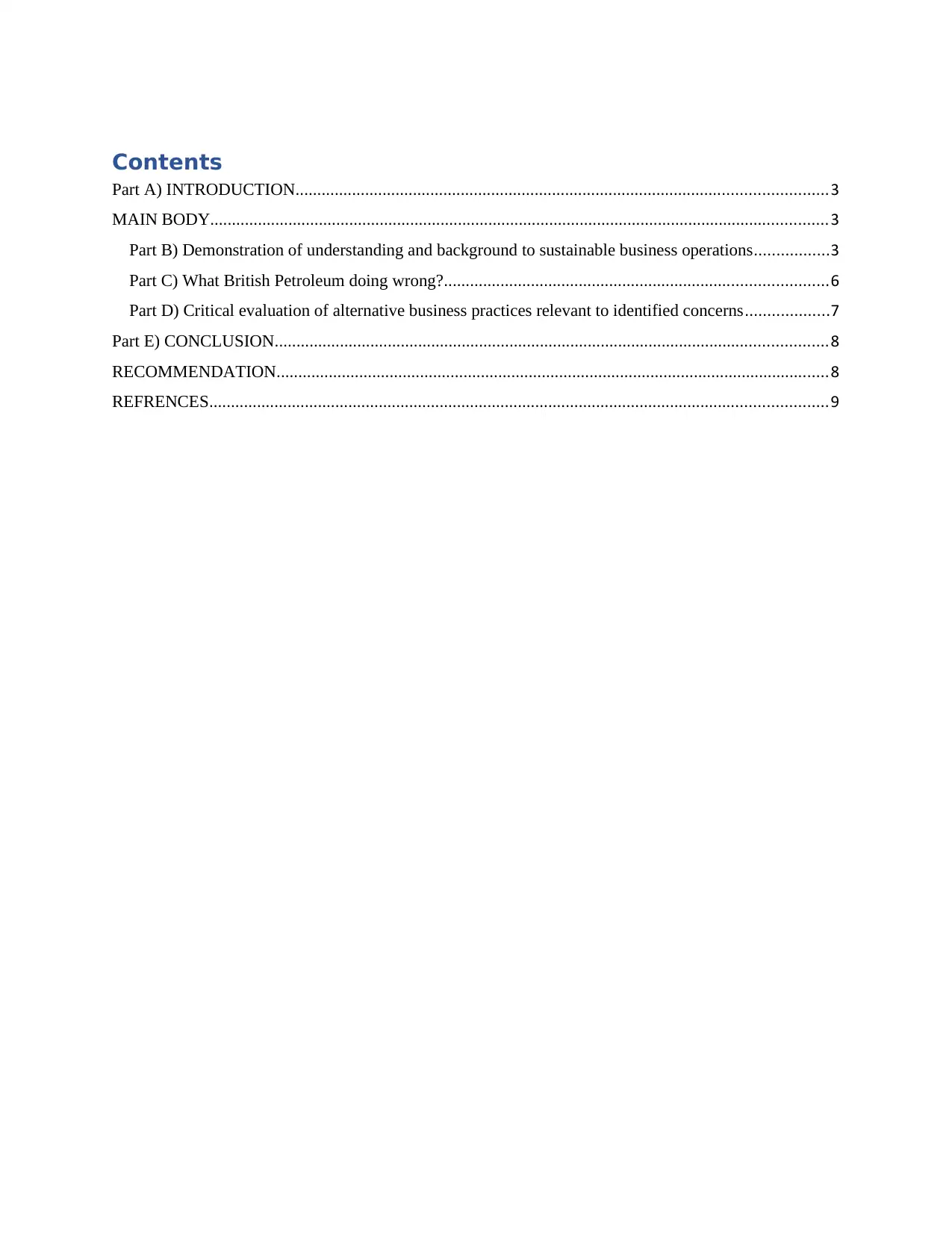
Contents
Part A) INTRODUCTION..........................................................................................................................3
MAIN BODY..............................................................................................................................................3
Part B) Demonstration of understanding and background to sustainable business operations.................3
Part C) What British Petroleum doing wrong?........................................................................................6
Part D) Critical evaluation of alternative business practices relevant to identified concerns...................7
Part E) CONCLUSION...............................................................................................................................8
RECOMMENDATION...............................................................................................................................8
REFRENCES..............................................................................................................................................9
Part A) INTRODUCTION..........................................................................................................................3
MAIN BODY..............................................................................................................................................3
Part B) Demonstration of understanding and background to sustainable business operations.................3
Part C) What British Petroleum doing wrong?........................................................................................6
Part D) Critical evaluation of alternative business practices relevant to identified concerns...................7
Part E) CONCLUSION...............................................................................................................................8
RECOMMENDATION...............................................................................................................................8
REFRENCES..............................................................................................................................................9
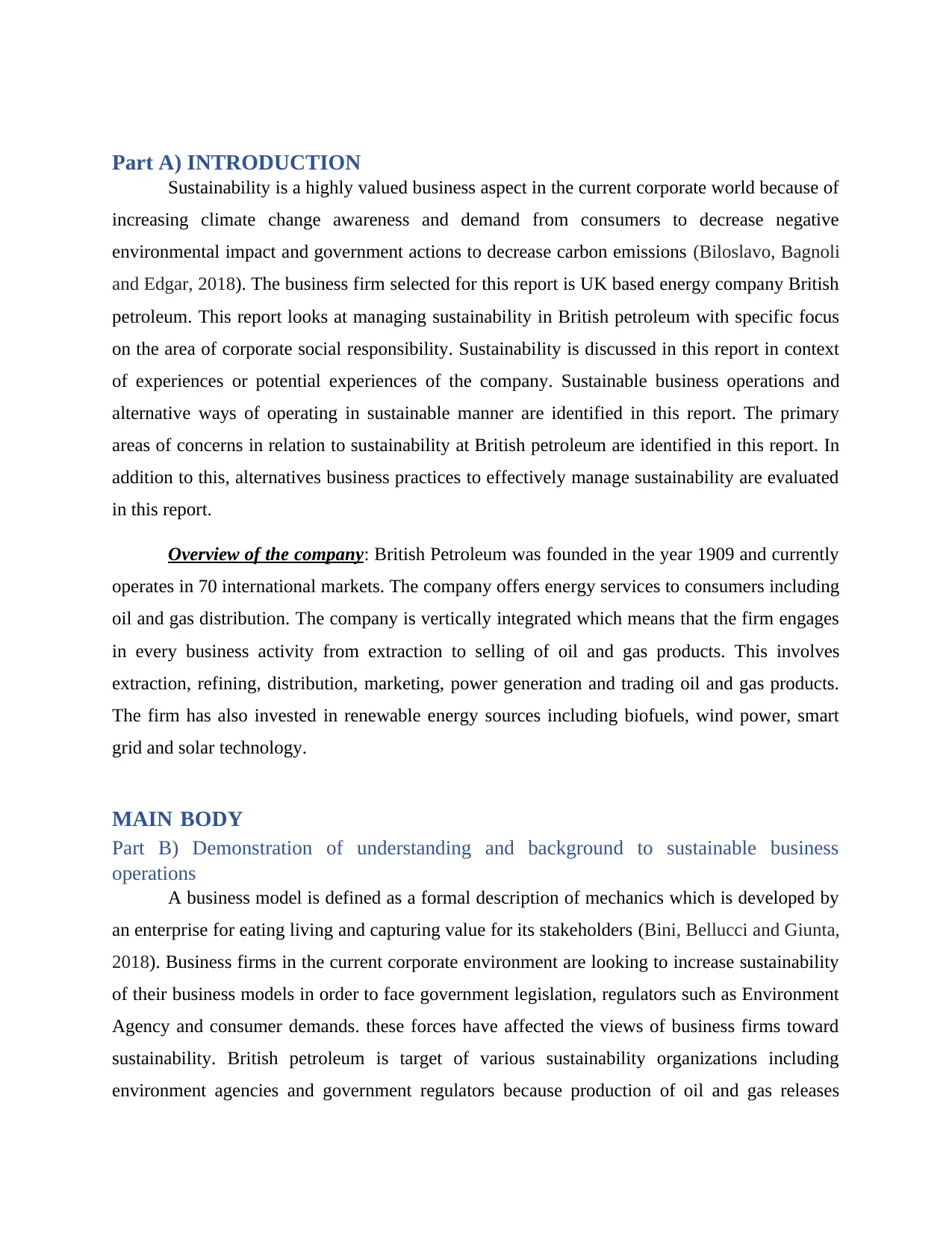
Part A) INTRODUCTION
Sustainability is a highly valued business aspect in the current corporate world because of
increasing climate change awareness and demand from consumers to decrease negative
environmental impact and government actions to decrease carbon emissions (Biloslavo, Bagnoli
and Edgar, 2018). The business firm selected for this report is UK based energy company British
petroleum. This report looks at managing sustainability in British petroleum with specific focus
on the area of corporate social responsibility. Sustainability is discussed in this report in context
of experiences or potential experiences of the company. Sustainable business operations and
alternative ways of operating in sustainable manner are identified in this report. The primary
areas of concerns in relation to sustainability at British petroleum are identified in this report. In
addition to this, alternatives business practices to effectively manage sustainability are evaluated
in this report.
Overview of the company: British Petroleum was founded in the year 1909 and currently
operates in 70 international markets. The company offers energy services to consumers including
oil and gas distribution. The company is vertically integrated which means that the firm engages
in every business activity from extraction to selling of oil and gas products. This involves
extraction, refining, distribution, marketing, power generation and trading oil and gas products.
The firm has also invested in renewable energy sources including biofuels, wind power, smart
grid and solar technology.
MAIN BODY
Part B) Demonstration of understanding and background to sustainable business
operations
A business model is defined as a formal description of mechanics which is developed by
an enterprise for eating living and capturing value for its stakeholders (Bini, Bellucci and Giunta,
2018). Business firms in the current corporate environment are looking to increase sustainability
of their business models in order to face government legislation, regulators such as Environment
Agency and consumer demands. these forces have affected the views of business firms toward
sustainability. British petroleum is target of various sustainability organizations including
environment agencies and government regulators because production of oil and gas releases
Sustainability is a highly valued business aspect in the current corporate world because of
increasing climate change awareness and demand from consumers to decrease negative
environmental impact and government actions to decrease carbon emissions (Biloslavo, Bagnoli
and Edgar, 2018). The business firm selected for this report is UK based energy company British
petroleum. This report looks at managing sustainability in British petroleum with specific focus
on the area of corporate social responsibility. Sustainability is discussed in this report in context
of experiences or potential experiences of the company. Sustainable business operations and
alternative ways of operating in sustainable manner are identified in this report. The primary
areas of concerns in relation to sustainability at British petroleum are identified in this report. In
addition to this, alternatives business practices to effectively manage sustainability are evaluated
in this report.
Overview of the company: British Petroleum was founded in the year 1909 and currently
operates in 70 international markets. The company offers energy services to consumers including
oil and gas distribution. The company is vertically integrated which means that the firm engages
in every business activity from extraction to selling of oil and gas products. This involves
extraction, refining, distribution, marketing, power generation and trading oil and gas products.
The firm has also invested in renewable energy sources including biofuels, wind power, smart
grid and solar technology.
MAIN BODY
Part B) Demonstration of understanding and background to sustainable business
operations
A business model is defined as a formal description of mechanics which is developed by
an enterprise for eating living and capturing value for its stakeholders (Bini, Bellucci and Giunta,
2018). Business firms in the current corporate environment are looking to increase sustainability
of their business models in order to face government legislation, regulators such as Environment
Agency and consumer demands. these forces have affected the views of business firms toward
sustainability. British petroleum is target of various sustainability organizations including
environment agencies and government regulators because production of oil and gas releases
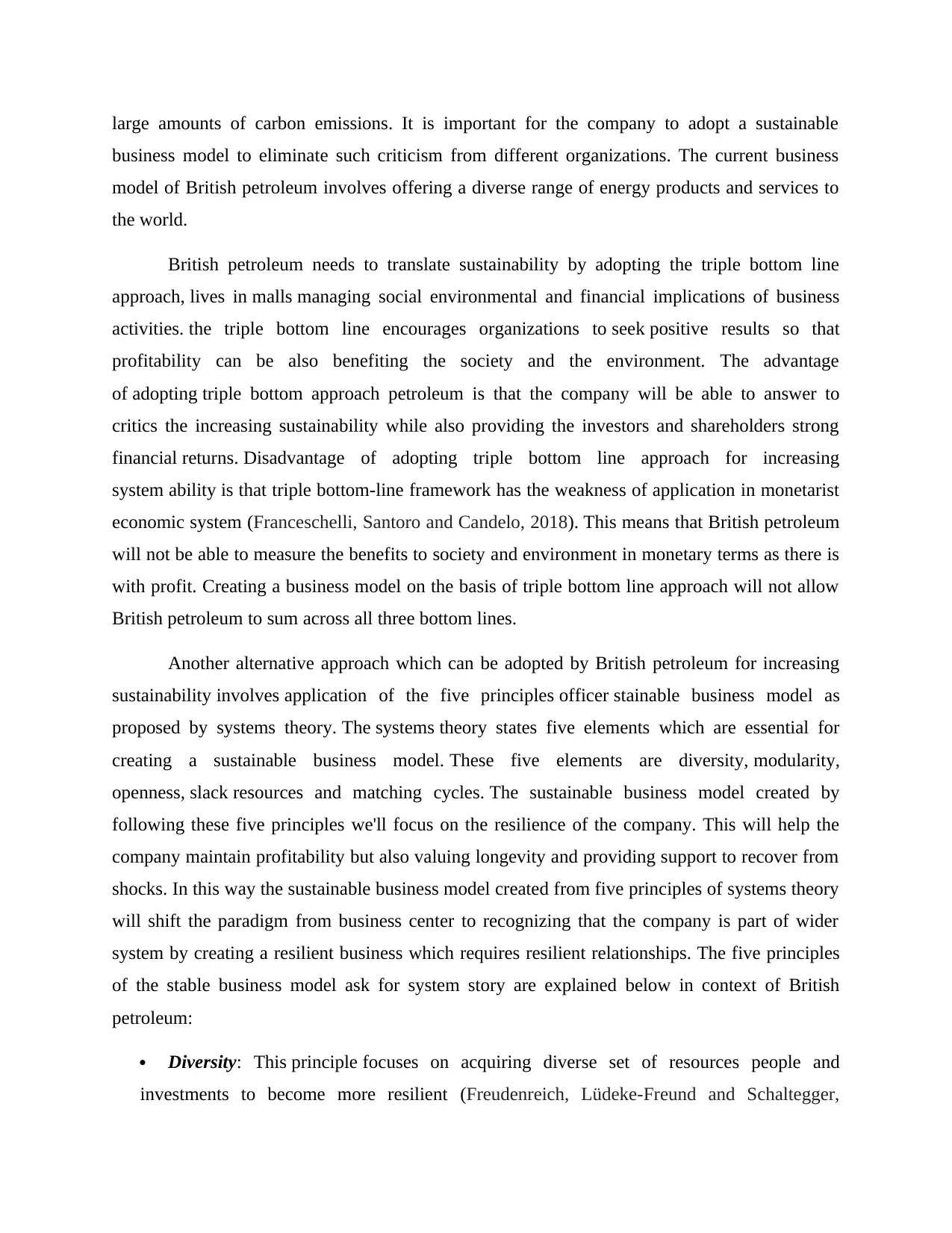
large amounts of carbon emissions. It is important for the company to adopt a sustainable
business model to eliminate such criticism from different organizations. The current business
model of British petroleum involves offering a diverse range of energy products and services to
the world.
British petroleum needs to translate sustainability by adopting the triple bottom line
approach, lives in malls managing social environmental and financial implications of business
activities. the triple bottom line encourages organizations to seek positive results so that
profitability can be also benefiting the society and the environment. The advantage
of adopting triple bottom approach petroleum is that the company will be able to answer to
critics the increasing sustainability while also providing the investors and shareholders strong
financial returns. Disadvantage of adopting triple bottom line approach for increasing
system ability is that triple bottom-line framework has the weakness of application in monetarist
economic system (Franceschelli, Santoro and Candelo, 2018). This means that British petroleum
will not be able to measure the benefits to society and environment in monetary terms as there is
with profit. Creating a business model on the basis of triple bottom line approach will not allow
British petroleum to sum across all three bottom lines.
Another alternative approach which can be adopted by British petroleum for increasing
sustainability involves application of the five principles officer stainable business model as
proposed by systems theory. The systems theory states five elements which are essential for
creating a sustainable business model. These five elements are diversity, modularity,
openness, slack resources and matching cycles. The sustainable business model created by
following these five principles we'll focus on the resilience of the company. This will help the
company maintain profitability but also valuing longevity and providing support to recover from
shocks. In this way the sustainable business model created from five principles of systems theory
will shift the paradigm from business center to recognizing that the company is part of wider
system by creating a resilient business which requires resilient relationships. The five principles
of the stable business model ask for system story are explained below in context of British
petroleum:
Diversity: This principle focuses on acquiring diverse set of resources people and
investments to become more resilient (Freudenreich, Lüdeke-Freund and Schaltegger,
business model to eliminate such criticism from different organizations. The current business
model of British petroleum involves offering a diverse range of energy products and services to
the world.
British petroleum needs to translate sustainability by adopting the triple bottom line
approach, lives in malls managing social environmental and financial implications of business
activities. the triple bottom line encourages organizations to seek positive results so that
profitability can be also benefiting the society and the environment. The advantage
of adopting triple bottom approach petroleum is that the company will be able to answer to
critics the increasing sustainability while also providing the investors and shareholders strong
financial returns. Disadvantage of adopting triple bottom line approach for increasing
system ability is that triple bottom-line framework has the weakness of application in monetarist
economic system (Franceschelli, Santoro and Candelo, 2018). This means that British petroleum
will not be able to measure the benefits to society and environment in monetary terms as there is
with profit. Creating a business model on the basis of triple bottom line approach will not allow
British petroleum to sum across all three bottom lines.
Another alternative approach which can be adopted by British petroleum for increasing
sustainability involves application of the five principles officer stainable business model as
proposed by systems theory. The systems theory states five elements which are essential for
creating a sustainable business model. These five elements are diversity, modularity,
openness, slack resources and matching cycles. The sustainable business model created by
following these five principles we'll focus on the resilience of the company. This will help the
company maintain profitability but also valuing longevity and providing support to recover from
shocks. In this way the sustainable business model created from five principles of systems theory
will shift the paradigm from business center to recognizing that the company is part of wider
system by creating a resilient business which requires resilient relationships. The five principles
of the stable business model ask for system story are explained below in context of British
petroleum:
Diversity: This principle focuses on acquiring diverse set of resources people and
investments to become more resilient (Freudenreich, Lüdeke-Freund and Schaltegger,
Secure Best Marks with AI Grader
Need help grading? Try our AI Grader for instant feedback on your assignments.
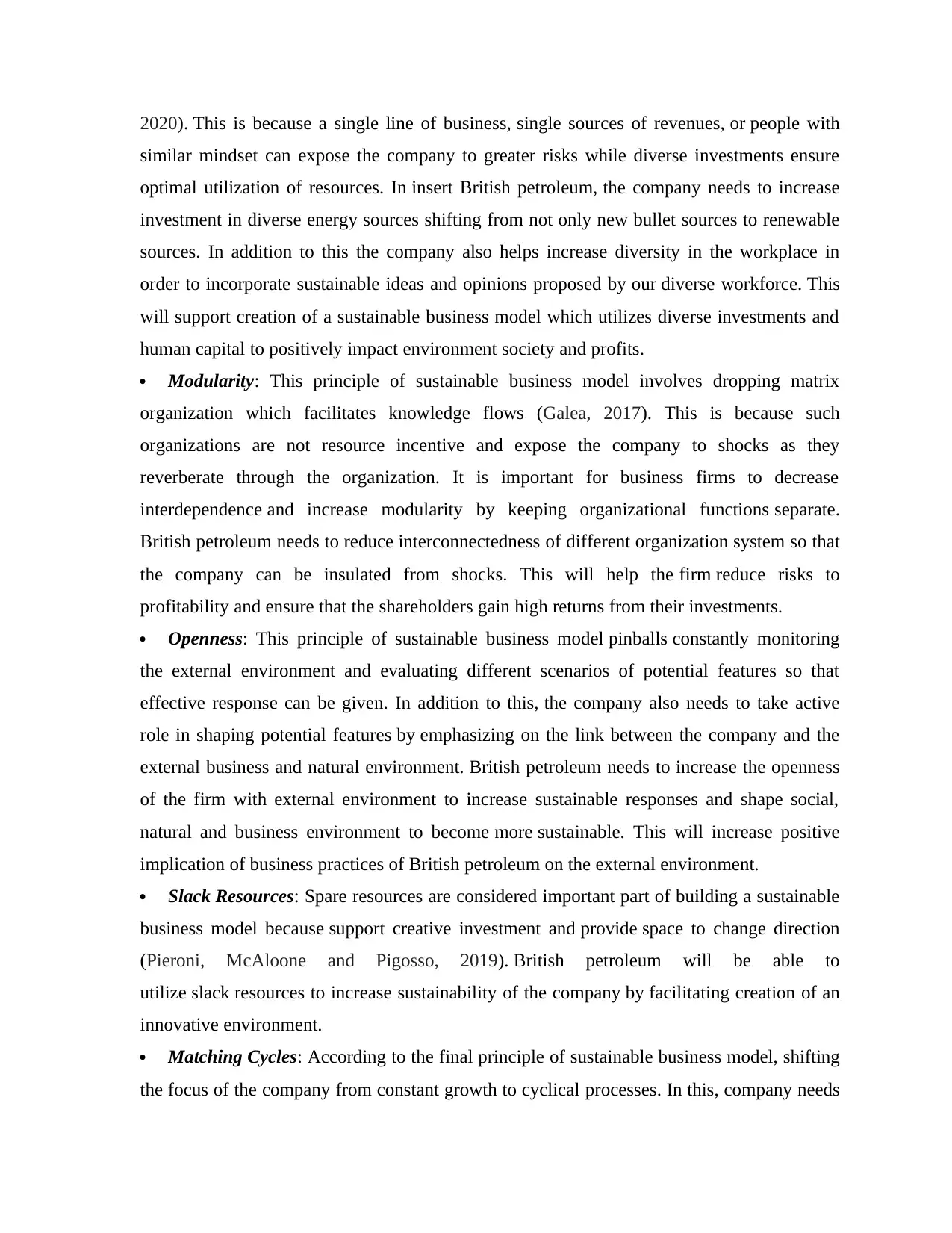
2020). This is because a single line of business, single sources of revenues, or people with
similar mindset can expose the company to greater risks while diverse investments ensure
optimal utilization of resources. In insert British petroleum, the company needs to increase
investment in diverse energy sources shifting from not only new bullet sources to renewable
sources. In addition to this the company also helps increase diversity in the workplace in
order to incorporate sustainable ideas and opinions proposed by our diverse workforce. This
will support creation of a sustainable business model which utilizes diverse investments and
human capital to positively impact environment society and profits.
Modularity: This principle of sustainable business model involves dropping matrix
organization which facilitates knowledge flows (Galea, 2017). This is because such
organizations are not resource incentive and expose the company to shocks as they
reverberate through the organization. It is important for business firms to decrease
interdependence and increase modularity by keeping organizational functions separate.
British petroleum needs to reduce interconnectedness of different organization system so that
the company can be insulated from shocks. This will help the firm reduce risks to
profitability and ensure that the shareholders gain high returns from their investments.
Openness: This principle of sustainable business model pinballs constantly monitoring
the external environment and evaluating different scenarios of potential features so that
effective response can be given. In addition to this, the company also needs to take active
role in shaping potential features by emphasizing on the link between the company and the
external business and natural environment. British petroleum needs to increase the openness
of the firm with external environment to increase sustainable responses and shape social,
natural and business environment to become more sustainable. This will increase positive
implication of business practices of British petroleum on the external environment.
Slack Resources: Spare resources are considered important part of building a sustainable
business model because support creative investment and provide space to change direction
(Pieroni, McAloone and Pigosso, 2019). British petroleum will be able to
utilize slack resources to increase sustainability of the company by facilitating creation of an
innovative environment.
Matching Cycles: According to the final principle of sustainable business model, shifting
the focus of the company from constant growth to cyclical processes. In this, company needs
similar mindset can expose the company to greater risks while diverse investments ensure
optimal utilization of resources. In insert British petroleum, the company needs to increase
investment in diverse energy sources shifting from not only new bullet sources to renewable
sources. In addition to this the company also helps increase diversity in the workplace in
order to incorporate sustainable ideas and opinions proposed by our diverse workforce. This
will support creation of a sustainable business model which utilizes diverse investments and
human capital to positively impact environment society and profits.
Modularity: This principle of sustainable business model involves dropping matrix
organization which facilitates knowledge flows (Galea, 2017). This is because such
organizations are not resource incentive and expose the company to shocks as they
reverberate through the organization. It is important for business firms to decrease
interdependence and increase modularity by keeping organizational functions separate.
British petroleum needs to reduce interconnectedness of different organization system so that
the company can be insulated from shocks. This will help the firm reduce risks to
profitability and ensure that the shareholders gain high returns from their investments.
Openness: This principle of sustainable business model pinballs constantly monitoring
the external environment and evaluating different scenarios of potential features so that
effective response can be given. In addition to this, the company also needs to take active
role in shaping potential features by emphasizing on the link between the company and the
external business and natural environment. British petroleum needs to increase the openness
of the firm with external environment to increase sustainable responses and shape social,
natural and business environment to become more sustainable. This will increase positive
implication of business practices of British petroleum on the external environment.
Slack Resources: Spare resources are considered important part of building a sustainable
business model because support creative investment and provide space to change direction
(Pieroni, McAloone and Pigosso, 2019). British petroleum will be able to
utilize slack resources to increase sustainability of the company by facilitating creation of an
innovative environment.
Matching Cycles: According to the final principle of sustainable business model, shifting
the focus of the company from constant growth to cyclical processes. In this, company needs
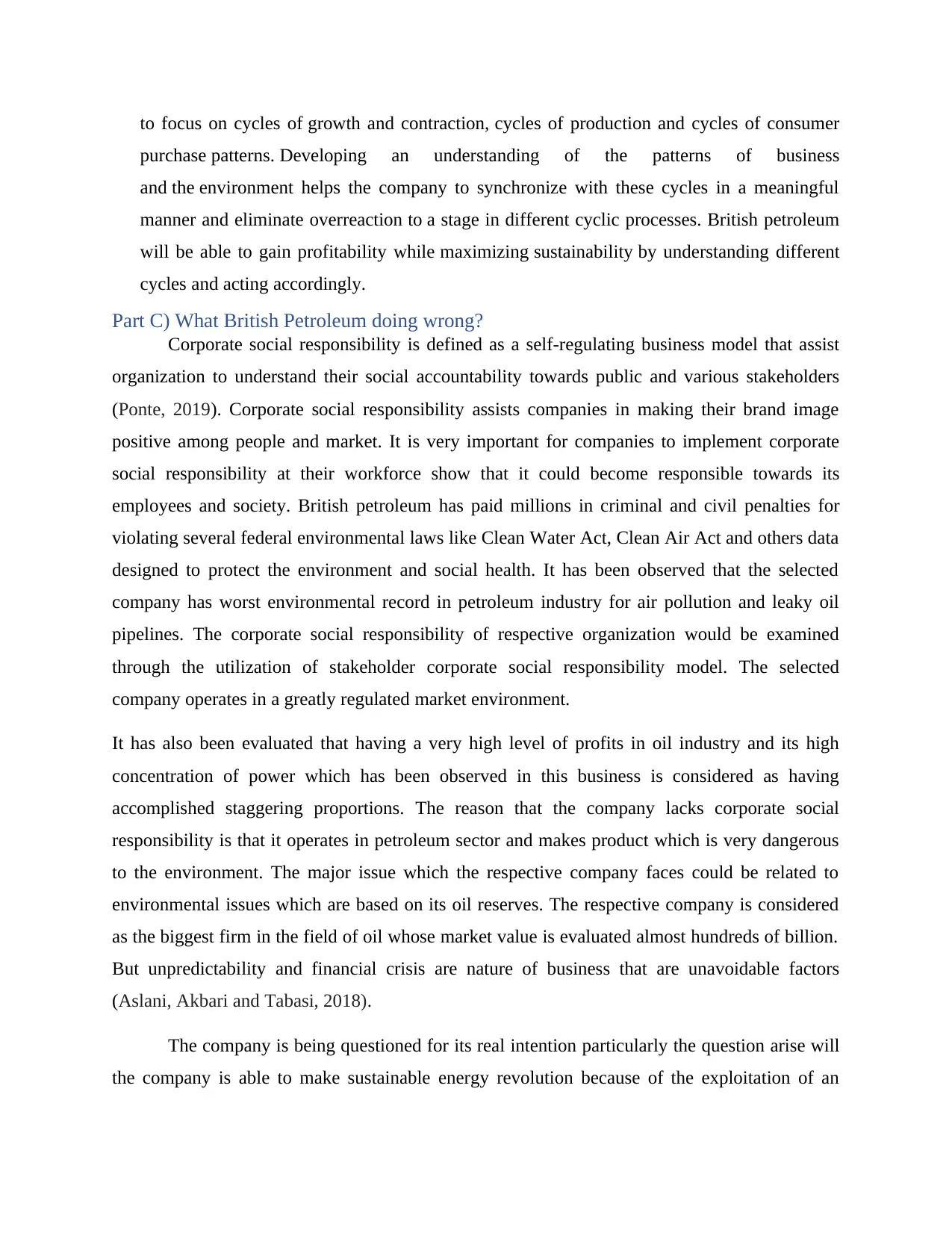
to focus on cycles of growth and contraction, cycles of production and cycles of consumer
purchase patterns. Developing an understanding of the patterns of business
and the environment helps the company to synchronize with these cycles in a meaningful
manner and eliminate overreaction to a stage in different cyclic processes. British petroleum
will be able to gain profitability while maximizing sustainability by understanding different
cycles and acting accordingly.
Part C) What British Petroleum doing wrong?
Corporate social responsibility is defined as a self-regulating business model that assist
organization to understand their social accountability towards public and various stakeholders
(Ponte, 2019). Corporate social responsibility assists companies in making their brand image
positive among people and market. It is very important for companies to implement corporate
social responsibility at their workforce show that it could become responsible towards its
employees and society. British petroleum has paid millions in criminal and civil penalties for
violating several federal environmental laws like Clean Water Act, Clean Air Act and others data
designed to protect the environment and social health. It has been observed that the selected
company has worst environmental record in petroleum industry for air pollution and leaky oil
pipelines. The corporate social responsibility of respective organization would be examined
through the utilization of stakeholder corporate social responsibility model. The selected
company operates in a greatly regulated market environment.
It has also been evaluated that having a very high level of profits in oil industry and its high
concentration of power which has been observed in this business is considered as having
accomplished staggering proportions. The reason that the company lacks corporate social
responsibility is that it operates in petroleum sector and makes product which is very dangerous
to the environment. The major issue which the respective company faces could be related to
environmental issues which are based on its oil reserves. The respective company is considered
as the biggest firm in the field of oil whose market value is evaluated almost hundreds of billion.
But unpredictability and financial crisis are nature of business that are unavoidable factors
(Aslani, Akbari and Tabasi, 2018).
The company is being questioned for its real intention particularly the question arise will
the company is able to make sustainable energy revolution because of the exploitation of an
purchase patterns. Developing an understanding of the patterns of business
and the environment helps the company to synchronize with these cycles in a meaningful
manner and eliminate overreaction to a stage in different cyclic processes. British petroleum
will be able to gain profitability while maximizing sustainability by understanding different
cycles and acting accordingly.
Part C) What British Petroleum doing wrong?
Corporate social responsibility is defined as a self-regulating business model that assist
organization to understand their social accountability towards public and various stakeholders
(Ponte, 2019). Corporate social responsibility assists companies in making their brand image
positive among people and market. It is very important for companies to implement corporate
social responsibility at their workforce show that it could become responsible towards its
employees and society. British petroleum has paid millions in criminal and civil penalties for
violating several federal environmental laws like Clean Water Act, Clean Air Act and others data
designed to protect the environment and social health. It has been observed that the selected
company has worst environmental record in petroleum industry for air pollution and leaky oil
pipelines. The corporate social responsibility of respective organization would be examined
through the utilization of stakeholder corporate social responsibility model. The selected
company operates in a greatly regulated market environment.
It has also been evaluated that having a very high level of profits in oil industry and its high
concentration of power which has been observed in this business is considered as having
accomplished staggering proportions. The reason that the company lacks corporate social
responsibility is that it operates in petroleum sector and makes product which is very dangerous
to the environment. The major issue which the respective company faces could be related to
environmental issues which are based on its oil reserves. The respective company is considered
as the biggest firm in the field of oil whose market value is evaluated almost hundreds of billion.
But unpredictability and financial crisis are nature of business that are unavoidable factors
(Aslani, Akbari and Tabasi, 2018).
The company is being questioned for its real intention particularly the question arise will
the company is able to make sustainable energy revolution because of the exploitation of an
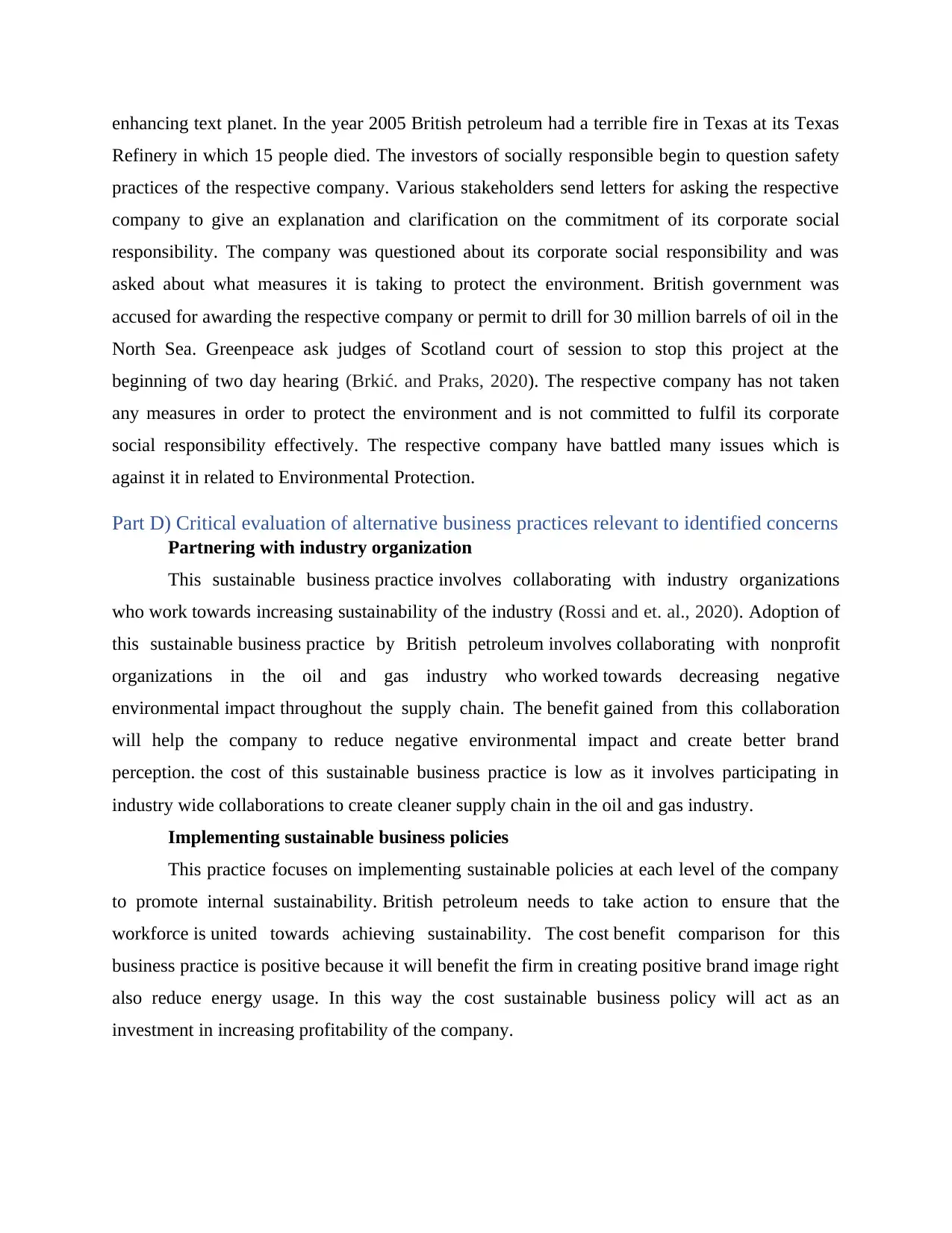
enhancing text planet. In the year 2005 British petroleum had a terrible fire in Texas at its Texas
Refinery in which 15 people died. The investors of socially responsible begin to question safety
practices of the respective company. Various stakeholders send letters for asking the respective
company to give an explanation and clarification on the commitment of its corporate social
responsibility. The company was questioned about its corporate social responsibility and was
asked about what measures it is taking to protect the environment. British government was
accused for awarding the respective company or permit to drill for 30 million barrels of oil in the
North Sea. Greenpeace ask judges of Scotland court of session to stop this project at the
beginning of two day hearing (Brkić. and Praks, 2020). The respective company has not taken
any measures in order to protect the environment and is not committed to fulfil its corporate
social responsibility effectively. The respective company have battled many issues which is
against it in related to Environmental Protection.
Part D) Critical evaluation of alternative business practices relevant to identified concerns
Partnering with industry organization
This sustainable business practice involves collaborating with industry organizations
who work towards increasing sustainability of the industry (Rossi and et. al., 2020). Adoption of
this sustainable business practice by British petroleum involves collaborating with nonprofit
organizations in the oil and gas industry who worked towards decreasing negative
environmental impact throughout the supply chain. The benefit gained from this collaboration
will help the company to reduce negative environmental impact and create better brand
perception. the cost of this sustainable business practice is low as it involves participating in
industry wide collaborations to create cleaner supply chain in the oil and gas industry.
Implementing sustainable business policies
This practice focuses on implementing sustainable policies at each level of the company
to promote internal sustainability. British petroleum needs to take action to ensure that the
workforce is united towards achieving sustainability. The cost benefit comparison for this
business practice is positive because it will benefit the firm in creating positive brand image right
also reduce energy usage. In this way the cost sustainable business policy will act as an
investment in increasing profitability of the company.
Refinery in which 15 people died. The investors of socially responsible begin to question safety
practices of the respective company. Various stakeholders send letters for asking the respective
company to give an explanation and clarification on the commitment of its corporate social
responsibility. The company was questioned about its corporate social responsibility and was
asked about what measures it is taking to protect the environment. British government was
accused for awarding the respective company or permit to drill for 30 million barrels of oil in the
North Sea. Greenpeace ask judges of Scotland court of session to stop this project at the
beginning of two day hearing (Brkić. and Praks, 2020). The respective company has not taken
any measures in order to protect the environment and is not committed to fulfil its corporate
social responsibility effectively. The respective company have battled many issues which is
against it in related to Environmental Protection.
Part D) Critical evaluation of alternative business practices relevant to identified concerns
Partnering with industry organization
This sustainable business practice involves collaborating with industry organizations
who work towards increasing sustainability of the industry (Rossi and et. al., 2020). Adoption of
this sustainable business practice by British petroleum involves collaborating with nonprofit
organizations in the oil and gas industry who worked towards decreasing negative
environmental impact throughout the supply chain. The benefit gained from this collaboration
will help the company to reduce negative environmental impact and create better brand
perception. the cost of this sustainable business practice is low as it involves participating in
industry wide collaborations to create cleaner supply chain in the oil and gas industry.
Implementing sustainable business policies
This practice focuses on implementing sustainable policies at each level of the company
to promote internal sustainability. British petroleum needs to take action to ensure that the
workforce is united towards achieving sustainability. The cost benefit comparison for this
business practice is positive because it will benefit the firm in creating positive brand image right
also reduce energy usage. In this way the cost sustainable business policy will act as an
investment in increasing profitability of the company.
Paraphrase This Document
Need a fresh take? Get an instant paraphrase of this document with our AI Paraphraser
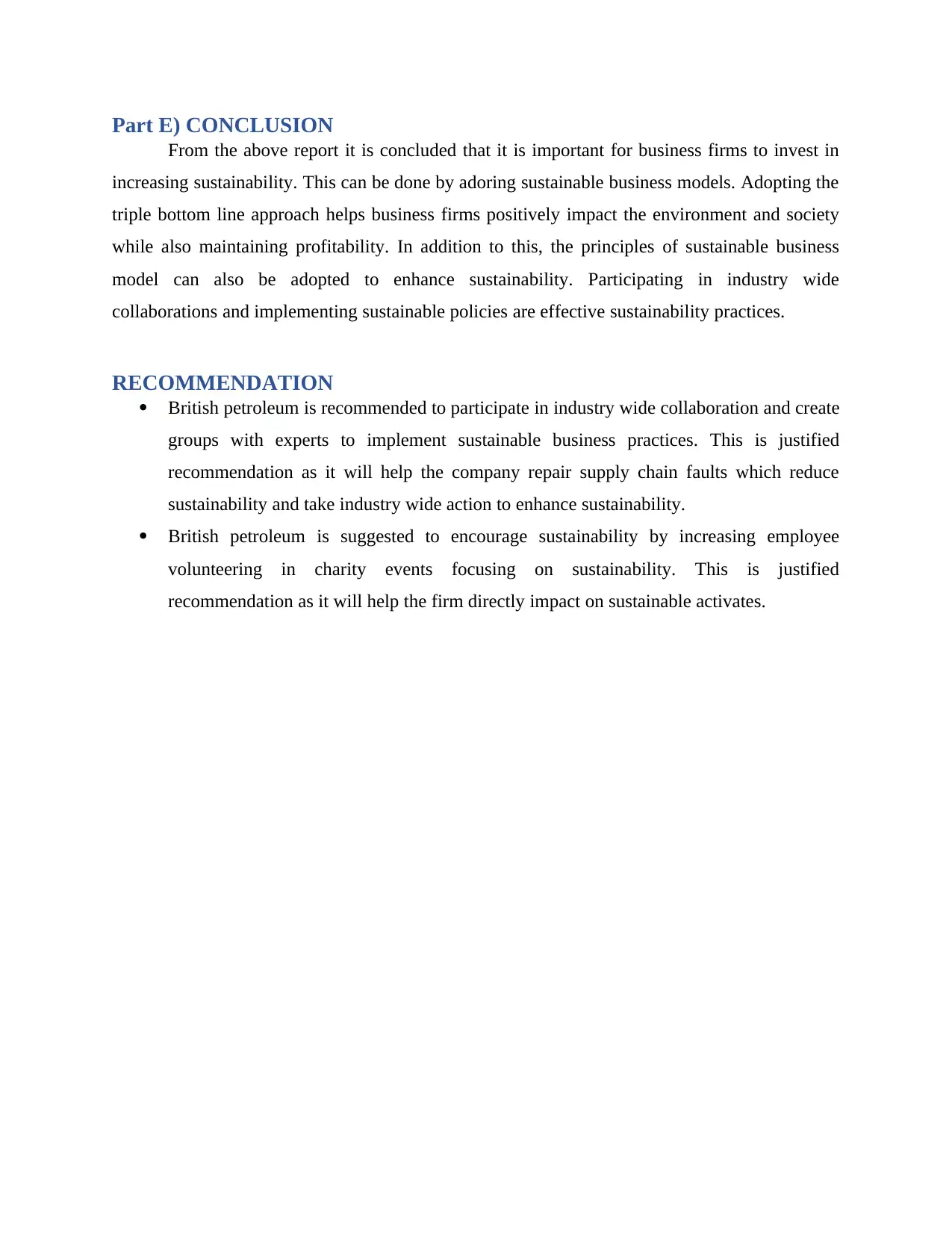
Part E) CONCLUSION
From the above report it is concluded that it is important for business firms to invest in
increasing sustainability. This can be done by adoring sustainable business models. Adopting the
triple bottom line approach helps business firms positively impact the environment and society
while also maintaining profitability. In addition to this, the principles of sustainable business
model can also be adopted to enhance sustainability. Participating in industry wide
collaborations and implementing sustainable policies are effective sustainability practices.
RECOMMENDATION
British petroleum is recommended to participate in industry wide collaboration and create
groups with experts to implement sustainable business practices. This is justified
recommendation as it will help the company repair supply chain faults which reduce
sustainability and take industry wide action to enhance sustainability.
British petroleum is suggested to encourage sustainability by increasing employee
volunteering in charity events focusing on sustainability. This is justified
recommendation as it will help the firm directly impact on sustainable activates.
From the above report it is concluded that it is important for business firms to invest in
increasing sustainability. This can be done by adoring sustainable business models. Adopting the
triple bottom line approach helps business firms positively impact the environment and society
while also maintaining profitability. In addition to this, the principles of sustainable business
model can also be adopted to enhance sustainability. Participating in industry wide
collaborations and implementing sustainable policies are effective sustainability practices.
RECOMMENDATION
British petroleum is recommended to participate in industry wide collaboration and create
groups with experts to implement sustainable business practices. This is justified
recommendation as it will help the company repair supply chain faults which reduce
sustainability and take industry wide action to enhance sustainability.
British petroleum is suggested to encourage sustainability by increasing employee
volunteering in charity events focusing on sustainability. This is justified
recommendation as it will help the firm directly impact on sustainable activates.
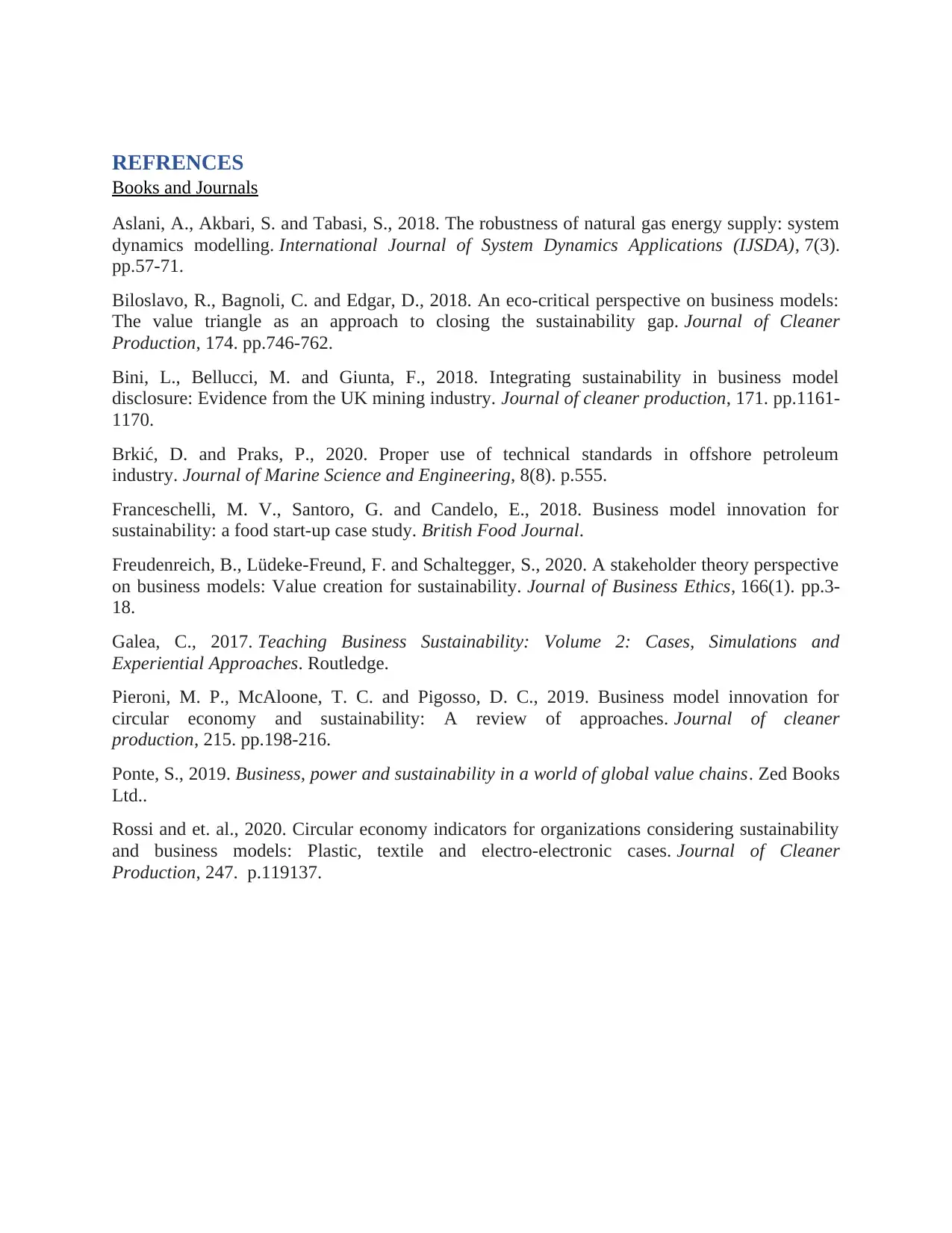
REFRENCES
Books and Journals
Aslani, A., Akbari, S. and Tabasi, S., 2018. The robustness of natural gas energy supply: system
dynamics modelling. International Journal of System Dynamics Applications (IJSDA), 7(3).
pp.57-71.
Biloslavo, R., Bagnoli, C. and Edgar, D., 2018. An eco-critical perspective on business models:
The value triangle as an approach to closing the sustainability gap. Journal of Cleaner
Production, 174. pp.746-762.
Bini, L., Bellucci, M. and Giunta, F., 2018. Integrating sustainability in business model
disclosure: Evidence from the UK mining industry. Journal of cleaner production, 171. pp.1161-
1170.
Brkić, D. and Praks, P., 2020. Proper use of technical standards in offshore petroleum
industry. Journal of Marine Science and Engineering, 8(8). p.555.
Franceschelli, M. V., Santoro, G. and Candelo, E., 2018. Business model innovation for
sustainability: a food start-up case study. British Food Journal.
Freudenreich, B., Lüdeke-Freund, F. and Schaltegger, S., 2020. A stakeholder theory perspective
on business models: Value creation for sustainability. Journal of Business Ethics, 166(1). pp.3-
18.
Galea, C., 2017. Teaching Business Sustainability: Volume 2: Cases, Simulations and
Experiential Approaches. Routledge.
Pieroni, M. P., McAloone, T. C. and Pigosso, D. C., 2019. Business model innovation for
circular economy and sustainability: A review of approaches. Journal of cleaner
production, 215. pp.198-216.
Ponte, S., 2019. Business, power and sustainability in a world of global value chains. Zed Books
Ltd..
Rossi and et. al., 2020. Circular economy indicators for organizations considering sustainability
and business models: Plastic, textile and electro-electronic cases. Journal of Cleaner
Production, 247. p.119137.
Books and Journals
Aslani, A., Akbari, S. and Tabasi, S., 2018. The robustness of natural gas energy supply: system
dynamics modelling. International Journal of System Dynamics Applications (IJSDA), 7(3).
pp.57-71.
Biloslavo, R., Bagnoli, C. and Edgar, D., 2018. An eco-critical perspective on business models:
The value triangle as an approach to closing the sustainability gap. Journal of Cleaner
Production, 174. pp.746-762.
Bini, L., Bellucci, M. and Giunta, F., 2018. Integrating sustainability in business model
disclosure: Evidence from the UK mining industry. Journal of cleaner production, 171. pp.1161-
1170.
Brkić, D. and Praks, P., 2020. Proper use of technical standards in offshore petroleum
industry. Journal of Marine Science and Engineering, 8(8). p.555.
Franceschelli, M. V., Santoro, G. and Candelo, E., 2018. Business model innovation for
sustainability: a food start-up case study. British Food Journal.
Freudenreich, B., Lüdeke-Freund, F. and Schaltegger, S., 2020. A stakeholder theory perspective
on business models: Value creation for sustainability. Journal of Business Ethics, 166(1). pp.3-
18.
Galea, C., 2017. Teaching Business Sustainability: Volume 2: Cases, Simulations and
Experiential Approaches. Routledge.
Pieroni, M. P., McAloone, T. C. and Pigosso, D. C., 2019. Business model innovation for
circular economy and sustainability: A review of approaches. Journal of cleaner
production, 215. pp.198-216.
Ponte, S., 2019. Business, power and sustainability in a world of global value chains. Zed Books
Ltd..
Rossi and et. al., 2020. Circular economy indicators for organizations considering sustainability
and business models: Plastic, textile and electro-electronic cases. Journal of Cleaner
Production, 247. p.119137.
1 out of 9
Related Documents
Your All-in-One AI-Powered Toolkit for Academic Success.
+13062052269
info@desklib.com
Available 24*7 on WhatsApp / Email
![[object Object]](/_next/static/media/star-bottom.7253800d.svg)
Unlock your academic potential
© 2024 | Zucol Services PVT LTD | All rights reserved.





